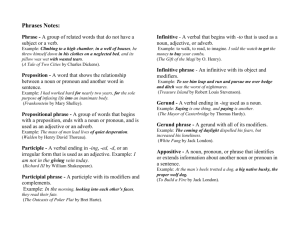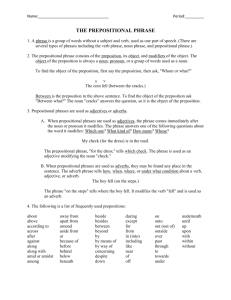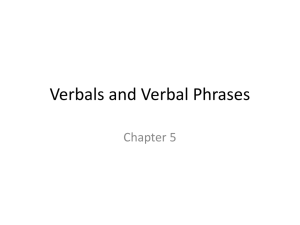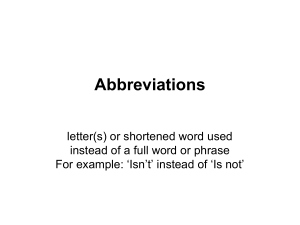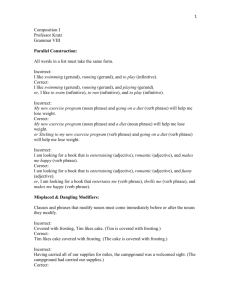a phrase is not a sentence
advertisement
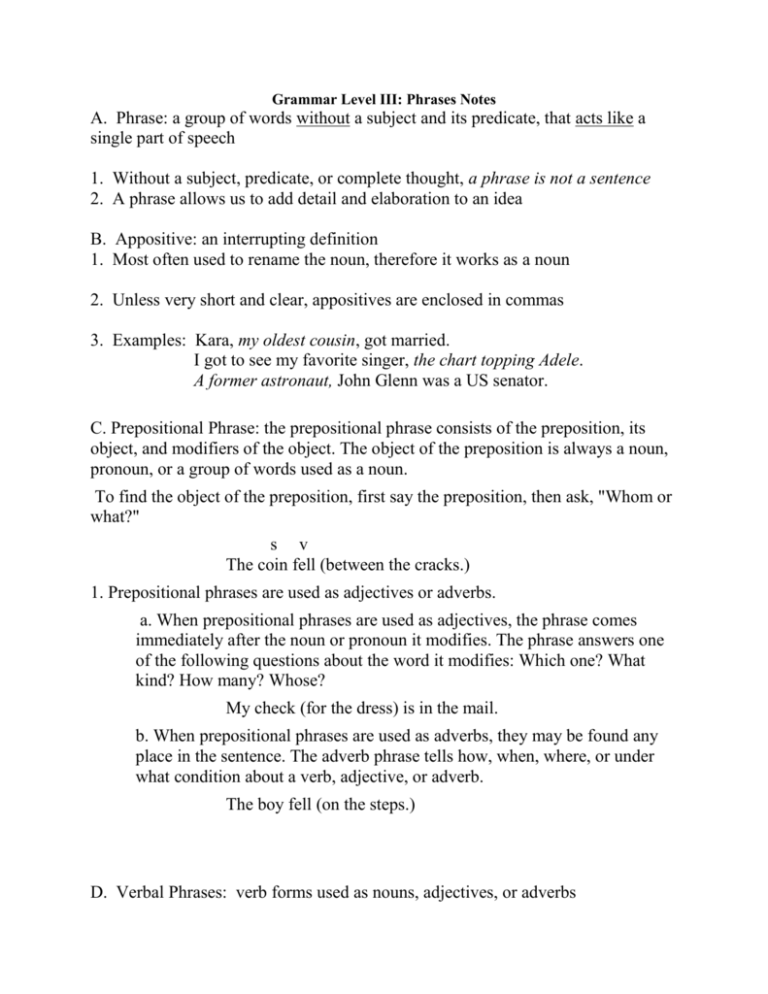
Grammar Level III: Phrases Notes A. Phrase: a group of words without a subject and its predicate, that acts like a single part of speech 1. Without a subject, predicate, or complete thought, a phrase is not a sentence 2. A phrase allows us to add detail and elaboration to an idea B. Appositive: an interrupting definition 1. Most often used to rename the noun, therefore it works as a noun 2. Unless very short and clear, appositives are enclosed in commas 3. Examples: Kara, my oldest cousin, got married. I got to see my favorite singer, the chart topping Adele. A former astronaut, John Glenn was a US senator. C. Prepositional Phrase: the prepositional phrase consists of the preposition, its object, and modifiers of the object. The object of the preposition is always a noun, pronoun, or a group of words used as a noun. To find the object of the preposition, first say the preposition, then ask, "Whom or what?" s v The coin fell (between the cracks.) 1. Prepositional phrases are used as adjectives or adverbs. a. When prepositional phrases are used as adjectives, the phrase comes immediately after the noun or pronoun it modifies. The phrase answers one of the following questions about the word it modifies: Which one? What kind? How many? Whose? My check (for the dress) is in the mail. b. When prepositional phrases are used as adverbs, they may be found any place in the sentence. The adverb phrase tells how, when, where, or under what condition about a verb, adjective, or adverb. The boy fell (on the steps.) D. Verbal Phrases: verb forms used as nouns, adjectives, or adverbs 1. Gerund Phrase: made up of a gerund, its object and all modifiers. a. gerund: an –ing verb used as a noun (subject, direct object, subject complement, object of prep.) i. Example: Swimming is fun. I love swimming. b. gerund object (gerund complement): gerunds can take direct objects i. Example: eating cake, taking a walk, painting the fence c. modifiers: gerunds can be modified with adjectives/adverbs i. Examples: Eating cake quickly can cause indigestion. Taking a walk at the park is great exercise. I’ve always hated painting the fence with a brush. 2. Participle Phrase—starts with a participle, its object and any modifiers Example: You could see the panther releasing its grip. a. participle: a verb form used as an adjective (modifies a noun or pronoun) i. present participles end in “ing” ii. regular past participles end in “ed” iii. irregular past participles can end in different ways –d, -t, en, -n The Verb rise Participle the rising sun Participle the risen sun Example of a Participle Phrase Rising out of the sea in front of us, the sun started to warm our faces. print break the printing the printed Printed on the very first press, the document document document was extremely valuable. the breaking the broken Broken by a government whistle-blower, news news the news is all over the media. b. use commas with participle phrases i. when phrase introduces the main clause ex. Removing his glasses, the professor shook his head. ii. when phrase interrupts the sentence ex. The news, broken by a whistle-blower, was all over the media. iii. when phrase comes at the end of the sentence away from the noun it modifies ex. Paul loved his boxing gloves, wearing them even to bed. iv. but not when the phrase immediately follows the noun it modifies ex. I saw Arthur running for the bus. 3. Infinitive a. the to- form of the verb, used as a noun or modifier (adjective or adverb) b. Examples: German is difficult to understand. (modifies adjective, difficult) To understand others is one of the hardest things in life. (noun, subject) More than anything, Julie wanted to understand her parents. (noun, dir obj) **Infinitive phrase or prepositional phrase? If a verb follows ‘to,’ it is an infinitive. If a noun or pronoun follows ‘to,’ it is a prepositional phrase: It is easy to imagine creatures from Mars. Of all the planets, Mars is most similar to Earth. c. Do not split your infinitives by putting an adverb or other word in between. Jessie tried to really understand the math problem. Jessie tried to understand the math problem.
